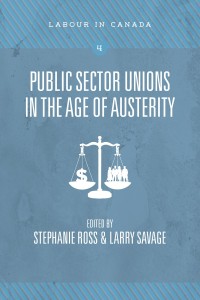Review in Labour Studies Journal
This book is part of the Labour in Canada series. It consists of ten chapters examining various aspects of public-sector labor relations, written by about a dozen Canadian academics. I’ll admit that when I agreed to review this book, I did not realize that it was about the experience of Canadian public-sector unions. To my very pleasant surprise, this book turned out to be quite interesting, even to someone totally unfamiliar with Canadian labor relations. Although I’m sure the authors were writing for a Canadian audience, they provide a clear enough explanation of Canadian political and economic circumstances that all the chapters were intelligible, even for someone from south of the border. Only half- way through the first chapter, I realized that in the “age of austerity,” public-sector unions face very similar issues on both sides of the border. In some cases, unions employed tactics that were very familiar; other chapters discussed tactics that U.S. public-sector unions haven’t used (or can’t). For me, the process of reading this book illuminated both how similar and how different unions in these two North American countries are. The overall theme of the book is the particular challenges faced by public-sector unions living under a neoliberal regime. Editors Ross and Savage provide an overall framework and set the stage for the other chapters. Not surprisingly, several of the chapters focus on the impact of politics and particularly the political activism (or lack thereof) of public-sector unions. In the first chapter, author Evans discusses what makes public-sector unions different and why they are particularly vulnerable to neoliberal attacks. The “Continuing Assault” chapter (Panitch and Swartz) details the attack on the legal framework for public-sector bargaining. The context of Canadian labor law seemed exotic to me, but the nature of the assault was depressingly familiar. Two of the chapters (Ross and Camfield) discuss the history and impact of social unionism on the power and success of public-sector unions. Several of the chapters focus on specific sectors of public workers, including federal workers, professionals, teachers, and nurses. In one chapter, Donna Baines deals with the fascinating and complicated problems faced by women working in the nonprofit social services sector. This is obviously a book by and for academics, but as a nonacademic, I found it surprisingly readable. There is a fair amount of jargon, but the authors are careful to explain the terms, so I could follow what they were saying. It’s not exactly a page-turner, but each chapter had enough of a narrative to keep my interest until the chapter’s conclusion. It probably helped that I was unfamiliar with all of these situations, so I didn’t know how the stories would turn out. This book would be a valuable read for anyone interested in the issue of how public-sector unions should respond to the challenges of neoliberalism, regardless of where you live. (Labor Studies Journal Volume 40, No. 1)
— Matthew Glasson, University of Iowa


